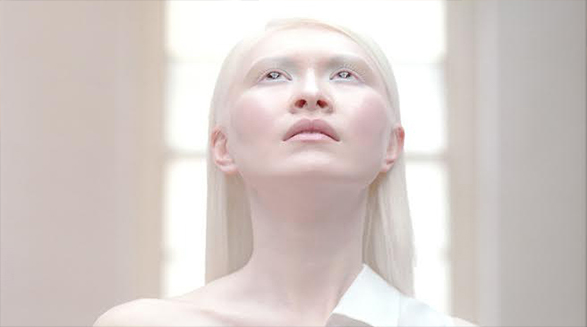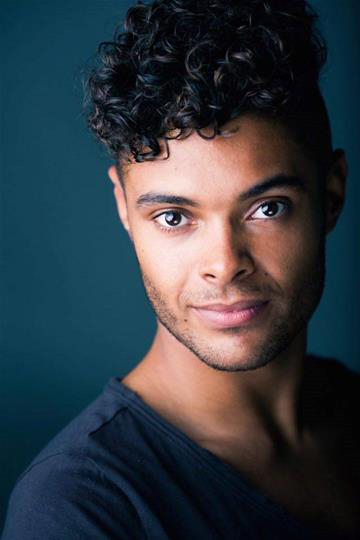We spoke to Connie Chiu – the world’s first albinistic fashion model
DtL: Hi Connie! Can you tell us a bit about yourself and your story so far?
Connie: I was born in Hong Kong, and come from a big family; I have three sisters and one brother. We moved to Sweden and grew up in a society where solidarity and equality was encouraged and taught in school. There I studied arts and radio journalism and never planned to become a model. My big sister studied fashion design and asked me to model for her college show – I enjoyed it and got good feedback from friends and family, so I wanted to see how far I could take it. I knew it wasn’t going to be easy, but there were people I admired in the industry and wanted to work with. I posted a black and white photo of myself with my name and phone number on the back to the French designer Jean Paul Gaultier. A few months later I was invited to Paris and did my second catwalk – for Jean Paul Gaultier! My career took off from there really; photoshoots for magazines such as Dazed and Confused, advertising, TV commercials…
DtL: What would you say has been your recipe for success?
Connie: Being myself. Don’t get me wrong, it takes time and work to get to know yourself and grow into the person you are happy and comfortable with. I think you work best with people if you are quite secure as a person, you can be open to new ideas and experiences on your own terms.
And good timing. When I first started modelling, there was no other model with my look, or albinism. I was quite surprised when a makeup artist called me a ‘pioneer’, on reflection, I suppose it was true. My priority and focus was to do good work, creating beautiful images.
DtL: How do you feel the media represents people with Albinism? What needs to change?
Connie: I don’t mind fairytale and science fiction inspired images, as long as there is variety and balance overall in the images and movie characters representing or represented by people with albinism. I can tell you from my own experience that these things matter and do influence people’s view on those with albinism. Many years ago there was a Chinese horror film featuring a character called ‘White Hair Devil Woman’; some Chinese people who thought I didn’t understand the language called me by this name. Last year, in a Chinese restaurant in Central London, a young Chinese waiter said to me that my hair was beautiful. ‘Like Frozen’, he added. ‘Thank you,’ I replied with a smile, ‘But no magic’.

DtL: Have you ever experienced bullying or negativity based on attitudes towards your appearance? If so can you tell us what happened and how you overcame the experience.
Connie: I think some people make assumptions about me based on my condition and my appearance. I was not bullied in school, but every now and then, people try to provoke or upset me. Once I was in Hong Kong, travelling on the underground by myself and after a while I felt that someone was staring at me. The population in Hong Kong is mainly Chinese and not mixed, like for example, London is. So I do understand that some people in Hong Kong are curious and can’t help but look. But this was different. I turned around and glanced at a couple of women who were staring at me; their faces were twisted with anger and hate. The tension was tangible; they were standing a few feet from me. There were plenty of people in the carriage, and that probably stopped them from verbally or physically attacking me. How did I deal with that situation? Well, it became quite clear to me that their intent was to make me feel hated; it wasn’t enough that they hated me. So, I decided not to be bothered by them. I was calm and relaxed as if I hadn’t noticed them. They were strangers and I had not done anything to upset them. Their feelings and attitudes had nothing to do with me, but with their own issues. A few stops later, the two women were getting ready to get off the train. It was fascinating to see the change in their demeanour; they turned very timid, apologetic and almost scared of the other passengers as they carefully stepped off the train.
DtL: What challenges do you face and how do you overcome them?
Connie: My condition comes with some physical challenges, such as light-sensitive eyesight, and skin that is sensitive to sunlight. I have learnt to live with it. The same could be said about dealing with people’s attitudes, for example, there is a difference between staring and staring. Most people are just curious and are in general nice and positive. Others want to insult and make you feel inferior. Those people are in general, unhappy, frustrated, scared, and probably in great need of support and understanding.
DtL: Do you find modelling empowering?
Connie: It can be. I always ask and discuss ideas before accepting a modelling job.
In many ways it is more empowering to be an independent jazz vocalist. As a model, you portray and become part of someone else’s idea. But as a jazz vocalist, I choose the songs, the style and the image I want the audience to see.
DtL: Our research not only revealed that 47% of young people want to change the way they look, but appearance was also cited as the number one aggressor of bullying. What advice would you give to readers who may be struggling to embrace their appearance?
Connie: Would people who are happy and secure in their own skin bully other people? No. People that bully are always scared and often jealous. I would like to say to everyone, including those that bully others, don’t always believe what people say about you. Be strong, be kind and find your own way in life.
DtL: If you could go back in time what would you tell your younger self?
Connie: Keep going. You’re on the right track. Remember to be kind and treasure people who help you and love you for who and all that you are.

DtL: At Ditch, we believe it is our differences that make us unique, and find they are often our strengths! What is the best thing about having albinism?
Connie: Not letting albinism define me. Not letting any one label define me. This may be surprising, but I think having albinism enables me to understand how complex identity can be. I appreciate all the things I am; not in any particular order, being Chinese, being a woman, growing up in Sweden and having a Swedish nationality, having albinism, loving jazz, being a chocoholic… I don’t want just one aspect of me to define and limit what I am, and what I want to do. I like my white hair, pale skin and violet eyes. But I also like my Chinese features. You see…complex.
DtL: What does the future hold for you?
Connie: I am in discussions with a photographer; we are planning to collaborate on a project – lots of close ups of face and body in beautiful landscapes. It will be on location, probably a beautiful beach somewhere. I love doing photoshoots on location.
I have just done an interview with a French magazine that will be published in a couple of months and I am also preparing for a gig next month singing songs from my debut EP, My Huckleberry Songs. I already have two music videos on YouTube and will release a new video soon.
So all in all, more modelling and more music. You can find my music on my YouTube channel.













